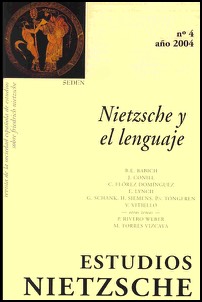Retórica, metáfora y concepto en Nietzsche
DOI:
https://doi.org/10.24310/EstudiosNIETen.vi4.9139Abstract
El trabajo analiza la reivindicación de la retórica por parte de Nietzsche; reivindicación que hace a partir de una teoría del lenguaje como obra de arte. La interpretación nietzscheana del lenguaje como fabulación le va a permitir a Nietzsche explicar la formación de conceptos a partir de la metáfora, lo que da pie para relacionar a Nietzsche con algunas teorías actuales sobre los conceptos. A partir de este análisis se estudia la interpretación nietzscheana del mito en relación con la ‘forma de conocimiento’ que él propone. El artículo concluye con una referencia a la importancia de los cínicos para comprender el modo nietzscheano de hacer filosofía.
Downloads
Metrics
References
Blumenberg, H., Conceptos en historias, tr. C.G. Canton, Síntesis, Madrid, 2003.
Blumenberg, H., El trabajo sobre el mito, tr. P. Madrigal, Paidós, Barcelona, 2003.
Brandom, R. B., La articulación de las razones, tr. E. de Bustos - E. Pérez, Siglo XXI, Madrid, 2002.
Genette, G., Ficción y dicción, tr. C. Manzano, Lumen, Barcelona, 1993.
Janz, C. P., Friedrich Nietzsche. 3. Los años del filósofo errante, tr. J. Muñoz, Madrid: Alianza, 1985, p. 381.
Kremer-Marietti, A., Nietzsche et la rhétorique, PUF, Paris, 1992, pp. 212 ss.
Marty, F., La naissance de la métaphysique chez Kant, Beauchesne, Paris, 1980.
Mauthner, F., Contribuciones a la crítica del lenguaje, tr. J. Moreno, Daniel Jorro, Madrid, 1911.
Nietzsche, F., Escritos sobre retórica, tr. L.E. de Santiago Guervós, Trotta, Madrid, 2000.
Nietzsche, F., Fragmentos Póstumos I-IV (FP). Director ed. Diego Sánchez Meca. Madrid: Tecnos, 2006-2010.
Nietzsche, F., Obras Completas, I-IV (OC ). Director ed. Diego Sánchez Meca. Madrid: Tecnos, 2011-2016
Schopenhauer, A., El mundo como voluntad y representación, tr. R. Rodríguez Aramayo, FCE, Madrid, 2003, vol. II, Suplemento XVII, p. 158.
Schrift, A., Nietzsche and the question of the interpretation, Routledge, London, 1990.
Unamuno, M., Del sentimiento trágico de la vida, en Obras Completas, Escelicer, Madrid, 1966, vol. VII, pp. 290-291.
Vaihinger, H., La voluntad de ilusión en Nietzsche, tr. T. Orduña, Cuadernos Teorema, Valencia, 1980.
Downloads
Published
How to Cite
Issue
Section
License
As of issue 21 (2021) this journal is published only in open access (diamond route).
From that number 21, like the previous numbers published in NIETZSCHE STUDIES, they are subject to the Creative Commons Acknowledgment-NoComercia-ShareIgual 4.0 license, the full text of which can be consulted at <http://creativecommons.org/licenses/by-nc-sa/4.0 >
It is the responsibility of the authors to obtain the necessary permissions of the images that are subject to copyright.
This work is licensed under a Creative Commons Attribution-NonCommercial-ShareAlike 4.0 International License.
Copyright generates two different rights: moral rights and patrimonial rights that EJFB recognizes and respects. Moral rights are those relating to the recognition of the authorship. They are rights of a personal nature that are perpetual, inalienable, unseizable and imprescriptible as consequence of the indivisible union of the author and his/her work.
Patrimonial rights are those that can be derived from the reproduction, distribution, adaptation or communication of the work, among others.







11.png)
